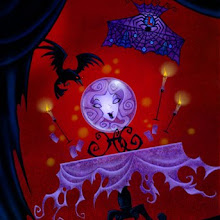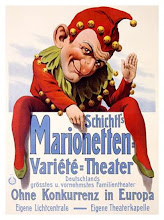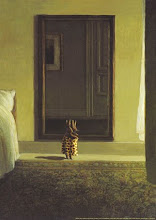
Part 4
After I was born, my father decided it was time to become a minister, and my parents waited in Baraterre for their first assignment from the Methodist Conference back home. It was a full eleven months before they were placed. Because my parents had come to the Exumas on their own, there was no income from the church, only what was left of their savings. They continued to rent the one-room flat over Fat Billy’s Ball ‘n’ Chain, and that alone is testament to their poverty, because my parents were teetotalers. We survived, ironically, through the grace of Billy, who passed on to us the condiments from the bar each night—a lot of nuts and citrus—and once a week, his brother would just happen to have caught a few extra fish, and the windfall became ours. My mother was never able to tell the story of our Christmas there without crying. Billy brought her a chicken, a precious commodity on Baraterre, on Christmas Eve, saying that his brother had accidentally run over it with his truck. When my mother showed skepticism about the wrapped carcass, Billy assured her that it was freshly dead and that the only trauma it had endured was from the wheel of the truck. My mother thanked him and took it, only realizing after he was gone and she unwrapped it that the headless chicken was otherwise whole. It could not have been hit by a truck and still be so deliciously intact, she knew. It must have been picked out and slaughtered especially for us.
When his assignment arrived, my father thought he was being sent to Colorado to minister to an Indian reservation, and that thrilled him. But since he couldn’t get his hands on any kind of map of the U.S. in Baraterre that was less than forty years old, he couldn’t be sure. There were no Indian reservations in eastern Colorado, though, just little towns like First View and Wild Horse that, if they were going to keep their faith alive in those days, depended on a Methodist circuit rider to drive from church to church preaching all day on Sundays.
He should have been happy, doing the Lord’s work among the already saved, but at the time he had no idea that the Conference was going to forget about us, that all four of us (I soon had a little brother, Jeffrey) would be staying there for the next sixteen years until we dried up like dead leaves, crazy enough to let that great spiraling tendency life has fling us apart.
Part 5
Eastern Colorado is flatter than Kansas. My brother Jeffrey, four years younger than me, seemed to be attracted to the immenseness of it from the day he was born. Whenever we took him outside in the daylight, you could see his little eyes, just barely able to focus, zeroing in on the farthest objects, sometimes the horizon itself. In the summers when it was hot, when he got a little older, we’d often find Jeff lying under the house with one side of his face pressed against the cool ground, staring out across the plain.
Jeff is an opera singer now, a tenor, one of the best in the world, and he is known for reaching into the back rows of the largest opera houses and pulling the hearts right out of the patrons’ chests with his voice. But I think he does it with his eyes. He learned to communicate with big empty spaces as a child.
To be continued…..
After I was born, my father decided it was time to become a minister, and my parents waited in Baraterre for their first assignment from the Methodist Conference back home. It was a full eleven months before they were placed. Because my parents had come to the Exumas on their own, there was no income from the church, only what was left of their savings. They continued to rent the one-room flat over Fat Billy’s Ball ‘n’ Chain, and that alone is testament to their poverty, because my parents were teetotalers. We survived, ironically, through the grace of Billy, who passed on to us the condiments from the bar each night—a lot of nuts and citrus—and once a week, his brother would just happen to have caught a few extra fish, and the windfall became ours. My mother was never able to tell the story of our Christmas there without crying. Billy brought her a chicken, a precious commodity on Baraterre, on Christmas Eve, saying that his brother had accidentally run over it with his truck. When my mother showed skepticism about the wrapped carcass, Billy assured her that it was freshly dead and that the only trauma it had endured was from the wheel of the truck. My mother thanked him and took it, only realizing after he was gone and she unwrapped it that the headless chicken was otherwise whole. It could not have been hit by a truck and still be so deliciously intact, she knew. It must have been picked out and slaughtered especially for us.
When his assignment arrived, my father thought he was being sent to Colorado to minister to an Indian reservation, and that thrilled him. But since he couldn’t get his hands on any kind of map of the U.S. in Baraterre that was less than forty years old, he couldn’t be sure. There were no Indian reservations in eastern Colorado, though, just little towns like First View and Wild Horse that, if they were going to keep their faith alive in those days, depended on a Methodist circuit rider to drive from church to church preaching all day on Sundays.
He should have been happy, doing the Lord’s work among the already saved, but at the time he had no idea that the Conference was going to forget about us, that all four of us (I soon had a little brother, Jeffrey) would be staying there for the next sixteen years until we dried up like dead leaves, crazy enough to let that great spiraling tendency life has fling us apart.
Part 5
Eastern Colorado is flatter than Kansas. My brother Jeffrey, four years younger than me, seemed to be attracted to the immenseness of it from the day he was born. Whenever we took him outside in the daylight, you could see his little eyes, just barely able to focus, zeroing in on the farthest objects, sometimes the horizon itself. In the summers when it was hot, when he got a little older, we’d often find Jeff lying under the house with one side of his face pressed against the cool ground, staring out across the plain.
Jeff is an opera singer now, a tenor, one of the best in the world, and he is known for reaching into the back rows of the largest opera houses and pulling the hearts right out of the patrons’ chests with his voice. But I think he does it with his eyes. He learned to communicate with big empty spaces as a child.
To be continued…..












1 comment:
Pretty amazing...looking forward to more!
Post a Comment